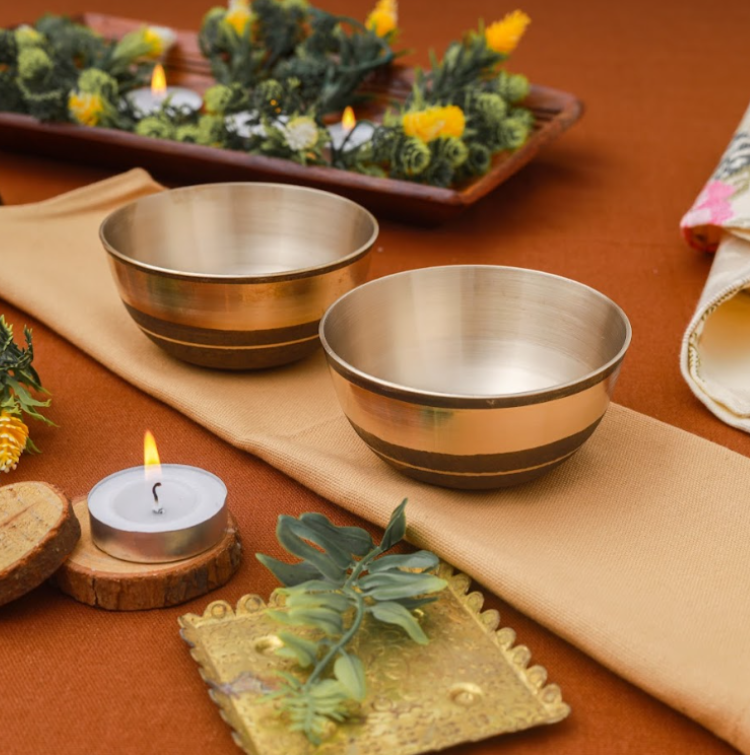




Did You Know?
Bronze utensils possess anti-microbial properties, reducing bacterial growth by up to 80%, making them a healthier option for daily use.
Why Bronze is a Must-Have for Your Home and Health?
-

Anti-Microbial
-

Boost immunity
-

Improves Digestion
-

Non-Toxic
-

Promotes Healthy Skin
FAQs
What are the main differences between brass and bronze?
Brass is an alloy primarily made of copper and zinc, while bronze is mainly composed of copper and tin. The difference in composition gives each metal distinct properties, such as color, strength, and corrosion resistance.
Can I cook in Kansa utensils?
Yes, Kansyam’s Cooking utensils, which are specially made with a copper-tin composition, are considered excellent for cooking as they distribute heat evenly and retain it well.
Are Kansa utensils suitable for acidic foods?
It’s advisable to avoid storing highly acidic foods in Kansa utensils as the acid may react with the metal, leaving black spots on the surface.
What are the health benefits of using Kansa utensils?
Kansa utensils are known for their natural health benefits. Cooking and eating in Kansa can help balance pH levels in the body, improve digestion, and enhance the nutritional value of food by adding trace minerals like copper and tin.
Are Kansa utensils prone to reddish stains in the rainy season?
- Kansa (bronze) utensils can develop reddish stains during the rainy season due to increased humidity and moisture in the air. The reddish color is a result of oxidation, where the copper content in the bronze reacts with oxygen and moisture, forming a layer of copper oxide.
Preparing a Cleaning Solution:
- Mix a small amount of Pitambari powder with water to form a paste. The consistency should be similar to that of a thick cream.
- Using a soft cloth or sponge, apply the Pitambari paste evenly over the surface of the Kansa utensil. Ensure you cover all the stained or discolored areas.
- Gently rub the paste into the surface in a circular motion. Be careful not to use abrasive materials that could scratch the utensil. A soft sponge or cloth is best for this.
- Rinse the utensil thoroughly with lukewarm water to remove all traces of the paste. Make sure no residue is left.
- Dry the utensil completely with a clean, soft cloth to prevent water spots and further oxidation.
- For added shine, you can use a metal polish designed for bronze or simply rub a little bit of lemon juice or vinegar on the surface before drying. Pitambari powder is effective at removing tarnish and stains while restoring the natural luster of Kansa utensils. Regular cleaning with Pitambari powder can help maintain the appearance and longevity of your bronze items.
When do Kansa utensils break?
Our Kansa utensils are crafted from a high-quality virgin alloy consisting of 78% copper and 22% tin. This specific composition, combined with a meticulous tempering process, ensures that the sheet metal Kansa is exceptionally durable.
The tempering process involves precise heating and gradual cooling, which strengthens the metal and enhances its resistance to breaking. As a result, our Kansa utensils are designed to withstand normal usage and temperature fluctuations without easily breaking or deforming.
How do lead and other impurities affect our health?
Tin is an essential component in the alloying of bronze or Kansa, but impurities in tin can affect the quality of Kansa utensils and potentially be harmful to health. Here are some common impurities in tin that can impact Kansa quality and safety:
Lead:
- Impact on Quality: Lead can make the alloy softer and more prone to deformation, reducing the durability of the Kansa utensils.
- Health Risks: Lead is toxic and can cause various health issues, including neurological problems, developmental delays in children, and kidney damage.
Arsenic:
- Impact on Quality: Arsenic can affect the mechanical properties of the alloy, potentially leading to brittleness or weakening of the metal.
- Health Risks: Exposure to arsenic can cause cancer, skin lesions, and other serious health conditions.
- Antimony:
- Impact on Quality: Antimony can affect the alloy’s hardness and overall mechanical properties, making it less suitable for use in utensils.
- Health Risks: High levels of antimony exposure can lead to respiratory problems, gastrointestinal issues, and other health complications.
Additional Information
Usage Instruction
You can use even soil, rakh or ash ( powder of burning wood) and pitambari powder which is widely available in market. Even soap and sponge also be using but you also have to use first step once a week which helps you to keep brighter your utensils.
T&C Applies*
This item is Non-Returnable, only eligible for Exchange within 2 days of delivery, in case of damage or wrongly dispatched. Cancellation request will be accepted strictly within 24 hours of placing the order only. Can not be cancelled or returned once shipped or delivered.
Application
Personal Usage, Diwali, Gifting on Special Occasions
Preparation Days
5-6 Business Days
















